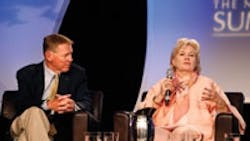One of the most common knocks on U.S. automakers over the years is the claim that they haven't been innovative enough. Pundits point to their Johnny-come-lately entrance into the hybrid market and the overall design of their vehicles.
The industry's comeback may hinge on whether it can identify workers with the skills and creativity to make the types of cars consumers want. That effort begins in the schools, and manufacturing experts who spoke in June at the National Summit in Detroit say preparing the future workforce for such challenges will take unique approaches to education. Many new workers seem to lack collaborative work-group experiences that prepare them for idea-sharing, says Ford Motor Co. President and CEO Alan Mulally.
"We get terrific people that are professionally competent in a specific discipline, but the biggest thing we have to do is to help them work together for innovation," says Mulally, who jokes that people who collaborate before they graduate are called cheaters. "So we just don't have a lot of venues where you get a chance to develop this working together and feel what it's like to be part of multidiscipline, multitask teams that actually can bring things together for the big-time innovation," he says.
Another area that's been the focus of education reform discussions is a greater emphasis on science, technology, engineering and math, or STEM. Educators should continue to strive for improvements in STEM subjects but without cutting other programs that foster creativity, says Deborah Wince-Smith, president of the Council on Competitiveness and assistant secretary for technology policy during the first Bush administration
Ford CEO Alan Mulally listens to Deborah Wince-Smith, Council on Competitiveness president, who says it's important to improve math and science standards for American students, but not at the expense of arts and social sciences programs that can help foster creativity. Mulally says today's workers seem to lack experience working in multidiscipline teams.
The classroom structure itself also could use a little tweaking, says John Kao, founder and chairman of the Institute for Large Scale Innovation. Too many classrooms are influenced by what he calls "agrarian and industrial society" that include the traditional rows of desks with teachers dictating from the front. He calls for learning environments that resemble a studio where people of different ages and skill sets come together to solve complex problems. "Innovation is not an academic subject," he says. "Innovation is a set of clinical practical disciplines, and you can only learn them, I believe, by actually doing them."
Wince-Smith says changes in the U.S. academic system need to be dramatic. "We need to have radical reform in schools and not just move around the edges," she says.
See Also
About the Author
Jonathan Katz
Former Managing Editor
Former Managing Editor Jon Katz covered leadership and strategy, tackling subjects such as lean manufacturing leadership, strategy development and deployment, corporate culture, corporate social responsibility, and growth strategies. As well, he provided news and analysis of successful companies in the chemical and energy industries, including oil and gas, renewable and alternative.
Jon worked as an intern for IndustryWeek before serving as a reporter for The Morning Journal and then as an associate editor for Penton Media’s Supply Chain Technology News.
Jon received his bachelor’s degree in Journalism from Kent State University and is a die-hard Cleveland sports fan.
